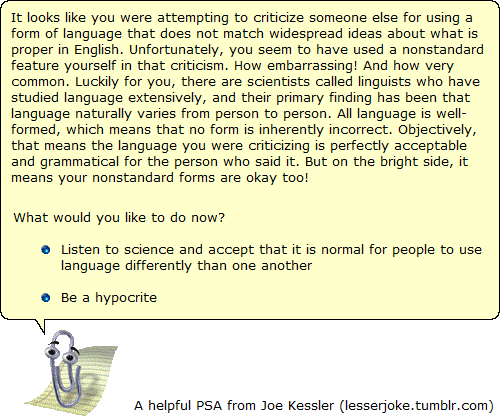So, is it truly unacceptable? As usual, I have a short answer and a long answer to this question. The short answer is of course not, because language doesn’t work that way. As I've discussed in other posts on this blog, no linguistic form is inherently unacceptable. Anything that a speaker intentionally produces is grammatical for them, and successfully serves the primary purpose of language: to communicate ideas with other people.
For the long answer, we'll need to look at the many, many reasons why singular they is a regular -- and useful! -- part of the standard English language.
First of all: even calling this pronoun use ‘singular’ is overlooking the fact that the pronoun is still grammatically plural. This can be seen in the verb agreement in the following standard English sentences:
1. Bill left his bag on the table, and I hope he comes back for it.
2. Some students left their bags on the table, and I hope they come back for them.
3. Some student left their bag on the table, and I hope they come back for it.
The ‘singular they’ in Sentence 3 is grammatically plural, because it is the subject of the verb "come" and that verb is inflected for a plural subject. If "they" in Sentence 3 were grammatically singular, that verb would be in the singular agreement form "comes" as in Sentence 1. So using a ‘singular they’ is not violating any grammatical rules of subject-verb agreement in standard English, and it is not changing the pronoun from a singular paradigm to a plural one. All that has changed is the referent of the pronoun.
So, is there a problem with plural-marked noun phrases having singular referents? Let's take a look at the subjects in the following standard English sentences, each of which refers to a single entity but is grammatically plural (as can be seen by the verb agreement):
4. My glasses are on the nightstand.
5. These scissors are sharp!
Standard English also has some plural-marked nouns with singular referents that are grammatically singular:
6. Checkers is my favorite game.
7. Measles is a terrible disease.
And plenty of singular-marked nouns with plural referents:
8. The army has defeated the enemy.
9. This band sounds awesome.
Not only that, but there’s variation across countries. The subjects in the above two sentences were grammatically singular, but the following sentences, which are regular in some dialects of British English, have singular-marked nouns with plural referents that are grammatically plural:
10. The gang are protecting their turf.
11. The committee meet once a week.
The conclusion of all this is simple. There may be a tendency in standard English for referent, form, and grammatical agreement to match one another in number, but there are plenty of cases where this is not true. One can hardly object to the plural pronoun "they" referring to a singular individual without also objecting to the above instances.
Second, singular they is highly useful. The other third-person singular pronouns in standard English require their speaker to make a comment about the gender of the referent, identifying that person as either masculine or feminine. And although it might not seem obvious at first, there may be many reasons why a speaker would not wish to do so. For example, the speaker may not consider the person’s gender relevant to the present discussion, or they may know that the person does not self-identify within the traditional male-female gender binary (and may thus be uncomfortable being labeled as "he" or "she"). When I find singular they most useful, however, is when the referent’s gender is simply unknown. Consider again the following sentence:
3. Some student left their bag on the table, and I hope they come back for it.
In this case, the speaker does not know who left the bag on the table. If we couldn’t use singular they as I have done above, we would have to refer to this person in one of the following ways:
12. Some student left his bag on the table, and I hope he comes back for it.
13. Some student left her bag on the table, and I hope she comes back for it.
14. Some student left his or her bag on the table, and I hope he or she comes back for it.
15. Some student left that student’s bag on the table, and I hope that student comes back for it.
Sentence 12 and 13 assert a gender that is not actually known to the speaker, and may thus be inaccurate. There is also an argument that that sort of sexist language — that is, treating people of an unspecified gender as a certain gender by default — encourages sexist thinking, and we probably want to avoid that when we can. Sentences 14 and 15 are less inaccurate as well as less sexist, but far more cumbersome to say or write than the elegant singular they.
Finally, I’ll bring my argument in favor of singular they back around to usage. Many, many speakers of English utilize this feature in their spoken and written language. If we want to be good scientists, we need to adopt an objective, descriptivist approach to language, and view it as it is actually spoken rather than as we might want it to be. Singular they is out there in the language — and it has been for quite some time. I’d invite you, in closing, to consider one last example sentence. This one was written in 1595 by a Mr. William Shakespeare, in his play Romeo and Juliet:
16. Arise; one knocks. / ...Hark, how they knock!
Juliet doesn’t know the identity of the person on the other side of her door, and thus she doesn’t know the gender either. Her solution is the same one that many speakers would adopt today: she uses the grammatically plural pronoun "they" to refer to a single individual.
